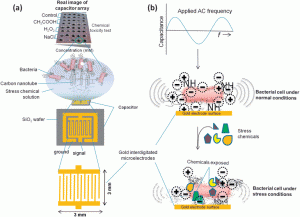
(a) Capacitor array biochip immobilized with viable E. coli and (b) response of E. coli and surface charge distribution under the applied AC electrical frequency.
Javed H. Niazi and colleagues from Sabanci University, Turkey, have developed a new capactitive biochip capable of detecting cellular stress caused by chemicals thanks to immobilised bacteria.
The biosensor works by using non-Faradaic electrochemical impedance spectroscopy to monitor changes in surface capacitance which occur when chemicals, such as acetic acid and hydrogen peroxide, disrupt the membrane function of the immobilised E. coli cells.
One referee described it as a “canary in a coal mine chip”.
The team still have some challenges to overcome but once properly developed, it could potentially be used as a cytotoxicity indicator.
It’s a must-read for anyone involved in drug, food and water safety research and will be free to access until 1st July.
Probing chemical induced cellular stress by non-Faradaic electrochemical impedance spectroscopy using an Escherichia coli capacitive biochip
Anjum Qureshi, Yasar Gurbuz and Javed H. Niazi
Analyst
DOI: 10.1039/C1AN15202E










